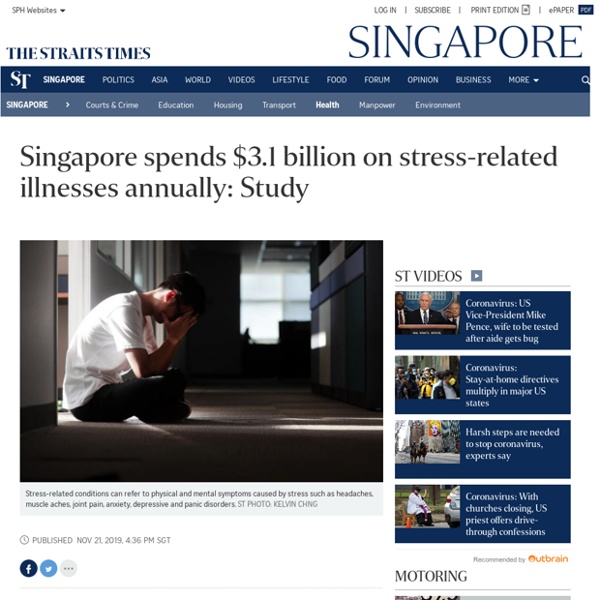Zoom
Trash



A whopping 92% of working Singaporeans are stressed – and women are prioritising families over themselves, study finds, Business Insider - Business Insider Singapore Pexels If you’re feeling stressed at work, you’re not alone. A vast majority of working Singaporeans are under stress, and women in particular feel that it’s less manageable, a survey has found. In the 2019 Cigna 360 Well-Being Survey, a whopping 92 per cent of working Singaporeans report feeling stressed, higher than the global average of 84 per cent. Of this, 13 per cent say their stress is unmanageable, which is on par with the global average, according to the study which surveyed a total of 13,200 online interviews in 23 markets, including 502 residents in Singapore. And stress doesn’t go undetected in the workplace.
healthxchange Long-term exposure to work stress can lead to occupational burnout. The Department of Internal Medicine at SGH shares its symptoms, prevention tips and complications. Continued from previous page. Warning signs of burnout Watch out for warning signs that you are experiencing too much stress. Are you having trouble sleeping or eating? Illnesses Caused by Stress Elevated stress levels can even raise your blood cholesterol. That is why it is important to check blood pressure regularly. If your blood pressure is elevated, see your doctor to find out why. If it is due to stress, take steps to deal with the underlying causes. 10. CancerMore and more studies are showing links between stress and various types of cancer.
Sleep can be good for your salary, says US study, United States News NEW YORK (NYTIMES) - It is widely known that sleep affects one's mood and health. Less understood is how it can also affect a person's salary. A study published last year in the Review of Economics and Statistics found that workers who live in locations where people get more sleep tend to earn more than those in areas where people get less. One theory: Better-rested workers are more productive and are compensated for it with additional income. "There are other explanations, but we consider them less likely," said an author of the study, Mr Matthew Gibson, an economist at Williams College. It is not as if simply sleeping more will lead to the boss paying the employee more.
Are you part of the 92%? Singapore's Stress Report Posted at 05:39h in Blog by Wendy Makundi If you’re living in Singapore and have trouble sleeping at night, chances are, you’re part of these statistics. Let’s check out our stress report. TODAYonline: Sleep-deprived Singaporean workers among most stressed globally: Survey Read more at SINGAPORE — Singaporeans are not only sleep deprived, but they are also among the most stressed at work globally, according to a survey by health service company Cigna released on Tuesday (Mar 26). Nearly 92 per cent of Singaporeans surveyed were stressed from work, which was higher than the global average of 84 per cent. Of this group, 13 per cent said that the stress they faced was unmanageable. Singaporeans’ physical wellness index also dipped by 4.4 percentage points from last year, which the survey attributed to an increase in sleepless nights.
TODAYonline SINGAPORE — Miss Wee Sihui is only 22, but the former retail assistant, who started working full-time early this year, is suffering burnout from work and its accompanying symptoms of feeling constant exhaustion, negativity, dread and pessimism. She used to work in a popular confectionery store and when there was a manpower crunch, she spent around 13 hours on her feet from 9.30am to around 10.30pm daily, juggling responsibilities meant for at least two employees. But it wasn’t just the physically punishing work routine that made her quit her job. The mental stress, fuelled by a lack of support at work, led to anxiety attacks. 10 Stress-Related Health Problems That You Can Fix Jay Winner, MD, author, Take the Stress out of Your Life; founder and director, Stress Management Program, Sansum Clinic, Santa Barbara, Calif. American Diabetes Association. American Heart Association. Blumenthal, J. Archives of Internal Medicine, October 1997. Family Caregiver Alliance: "Selected Caregiver Statistics."
Useful Apps To Reduce Stress And Anxiety - CLEO Singapore The battle with mental health is very real. In Singapore, more and more individual and agencies are taking steps to minimise the stigma surrounding mental health. In September, National Council of Social Service released a heartstrings-tugging video of a social experiment that highlights how the society view people with mental health conditions. The Main Causes of Stress Stress is normal and, to some extent, a necessary part of life. Despite it being something everyone experiences, what causes stress can differ from person to person. For instance, one person may become angry and overwhelmed by a serious traffic jam, while another might turn up their music and consider it a mild inconvenience.